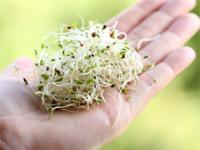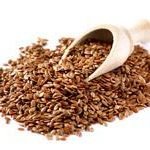Considered to be one of the first known herbs, alfalfa is a revered medicinal herb that has a multitude of healing benefits associated with it. In fact, it is so revered that the word alfalfa, derived from Arabic, literally means “father of all foods.” Alfalfa is not just considered vital to herbal medicine, but also is used for livestock feed and for fertilizing agricultural lands. Part of the reason for its revered status is found in the way the plant grows. Alfalfa has an extensive root system that can reach as far as 60 feet underground. This allows the plant to not only absorb minerals that are not available on the surface soil, but also higher quantities of vitamins and minerals than your typical plant.
Alfalfa for Overall Nutrition
While alfalfa may help with specific conditions, its use as an overall superfood is more common. In fact, alfalfa leaf helps the body assimilate protein, calcium, and other nutrients and is a great source of vitamins A, C, E, and K, as well as some minerals including calcium, potassium, phosphorus, and iron. It is a rich source of chlorophyll and is the richest land source of trace minerals—again, because of its extensive root system. And it is high in fructo-oligosaccarides, which “fertilize” healthy bacteria in the gut and help neutralize bad bacteria overgrowth such as Candida.
Alfalfa as a Natural Diuretic
So, what else is alfalfa good for? Like many ancient herbs, alfalfa has a nearly endless list of health benefits. According to the Memorial Sloan-Kettering Cancer Center, alfalfa is thought to have diuretic properties, especially for issues related to water retention or urinary tract infections. It is also a well-known natural laxative. This can be extremely helpful, as using a herb based laxative or diuretic can help decrease additional irritations that may occur from over-the-counter remedies.
Alfalfa for Cholesterol
Due to its high vitamin and mineral content, it is also considered to be effective in lowering cholesterol–an benefit which has been verified in animal studies. It is the saponins and phytoesterols found in alfalfa that help block the absorption of cholesterol for natural heart health. And when alfalfa is taken with manganese, it can assist in stabilizing blood sugar levels, which helps in making it effective against diabetes.
Alfalfa for Natural Heart Health
Regular consumption of the herb has also been shown to lower blood pressure and balance hormones. And alfalfa also helps prevent atherosclerosis, also known as hardening of the arteries.
Other Natural Health Benefits of Alfalfa
Alfalfa extract is a well-known blood and liver purifier and may be helpful with thyroid gland malfunction. The herb is considered effective against arthritis, peptic ulcers, and can even help promote menstruation and lactation. Because of the high levels of calcium and magnesium in alfalfa, regular consumption can help reduce headaches and migraines.
In addition to all of these benefits, alfalfa is also credited as a remedy for the following:
- bad breath
- sore or achy joints
- skin conditions
- kidney problems
- autoimmune disorders
- strokes
- whooping cough
- general digestive problems
- bowel movement regularity
- healthy hydration
How to Use Alfalfa
As you can see, there are plenty of benefits associated with alfalfa to make it a regular part of your diet. Luckily, it is easy to find sources for consumption as well. The herb can be taken in capsule form, brewed as a tea, or eaten fresh and added to sandwiches, soups, and salads in the form of alfalfa sprouts. The herb is very mild in taste, and as such as can be used in just about anything where you’d like to pack a little extra superfood punch.
Resources:
http://www.mskcc.org/cancer-care/herb/alfalfa
http://www.uofmhealth.org/health-library/hn-2035004
http://www.homeremediesweb.com/alfalfa_health_benefits.php
http://www.herbwisdom.com/herb-alfalfa.html
http://www.globalhealingcenter.com/natural-health/benefits-of-alfalfa-leaf/









alfalfa sprouts health waring
In Sally Fallon’s book, ” Nourishing Traditions” bottom of page-113 she states that tests show alfalfa sprouts can inhibit the immune system and can contribute to inflammatory arthritis and lupus. The seeds contain an amino acid called canavanine that can be toxic taken in quantity, but is not found in the mature plants. I’m just trying to be helpful, for what it’s worth. Thank You for All You do!! Happy Customer and Subscriber Joey M. Bupp
Alfalfa
I have a 34 year old part bred Arab Mare, who loses weight most noticeably every winter. However, for the past three months I have been adding Alfalfa pellets and dried chopped alfalfa to her already very nutritious feed.
The effect is nothing short of amazing. She is plump, muscly and lively.
I must try some myself! (not to put on weight, but for the other benefits!)
gmo alfalfa
Since alfalfa is one of the latest crops to be bred as a genetically modified/biotech crop, it is essential that your source be organic lest you, instead of reaping benefits, actually perpetuate and accelerate whatever health issues you have or are trying to avoid.
Foul play
GMO is like NASA out of bounce
NASA is outofbouce timeout
NASA is outofbouce timeout GMO is out of use fullness like space is out of time
And why would eighnstienneed a blank check or cash
E = mc squared sounds like a buy offa sell out or a whistleblowers dreemloophold
Faith andhealth
Passive is the progressive basses forever evolving ballence tree
squared what’s e got to do with anything squared in two thousand years we are religious to stupidity.if the son is a condenser and a cracker
Whoate the soup as a burnt offering
Sprout is to christ as tree is to god mohomidis tochrist as alais to all who believe or don’t believe mahomid ali boxing. as Jesus cashious clay as ala a major contender
Jan 31 2017
I think the folks making these comments are taking more than just alfalfa. Most natural herbs support mental clarity.